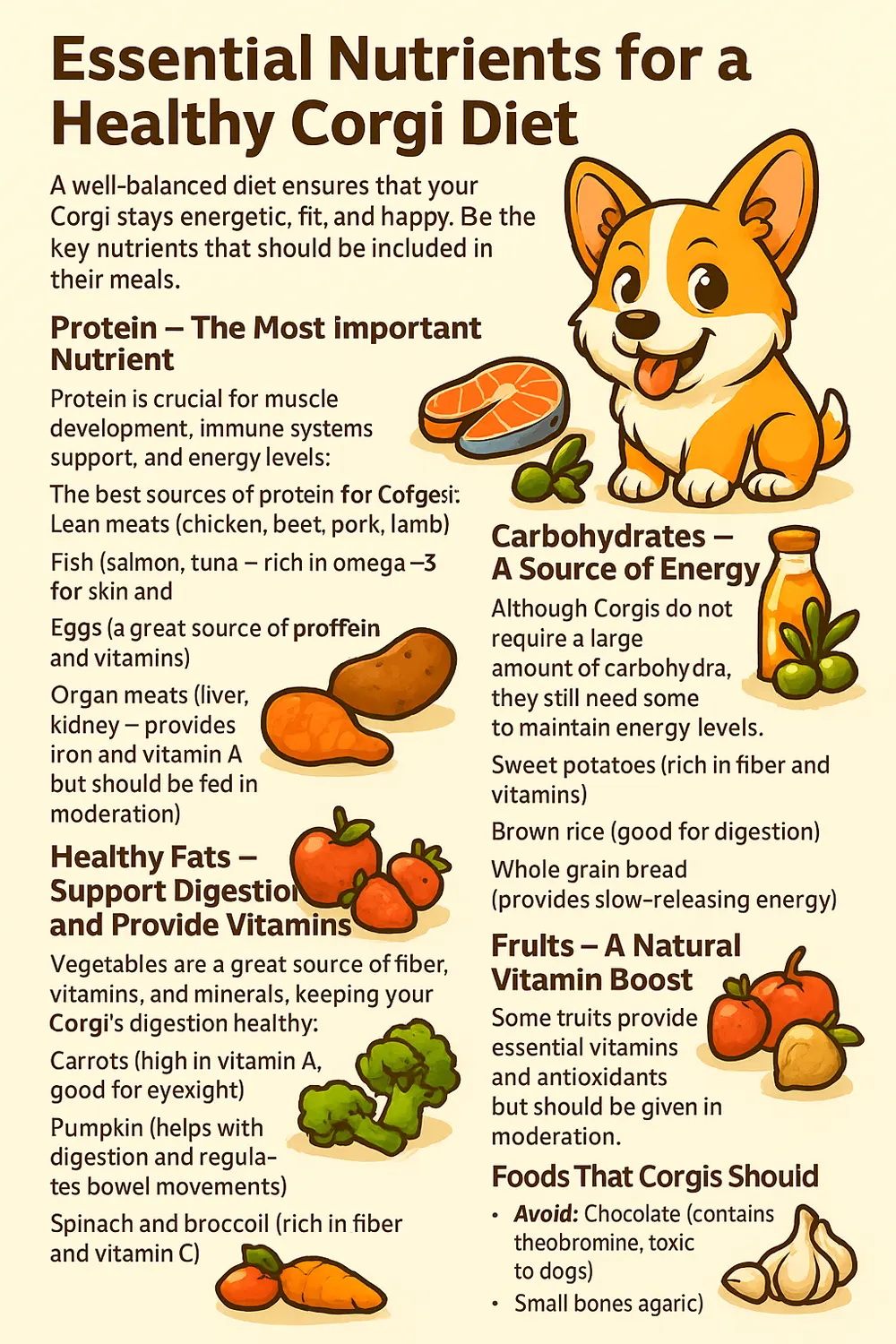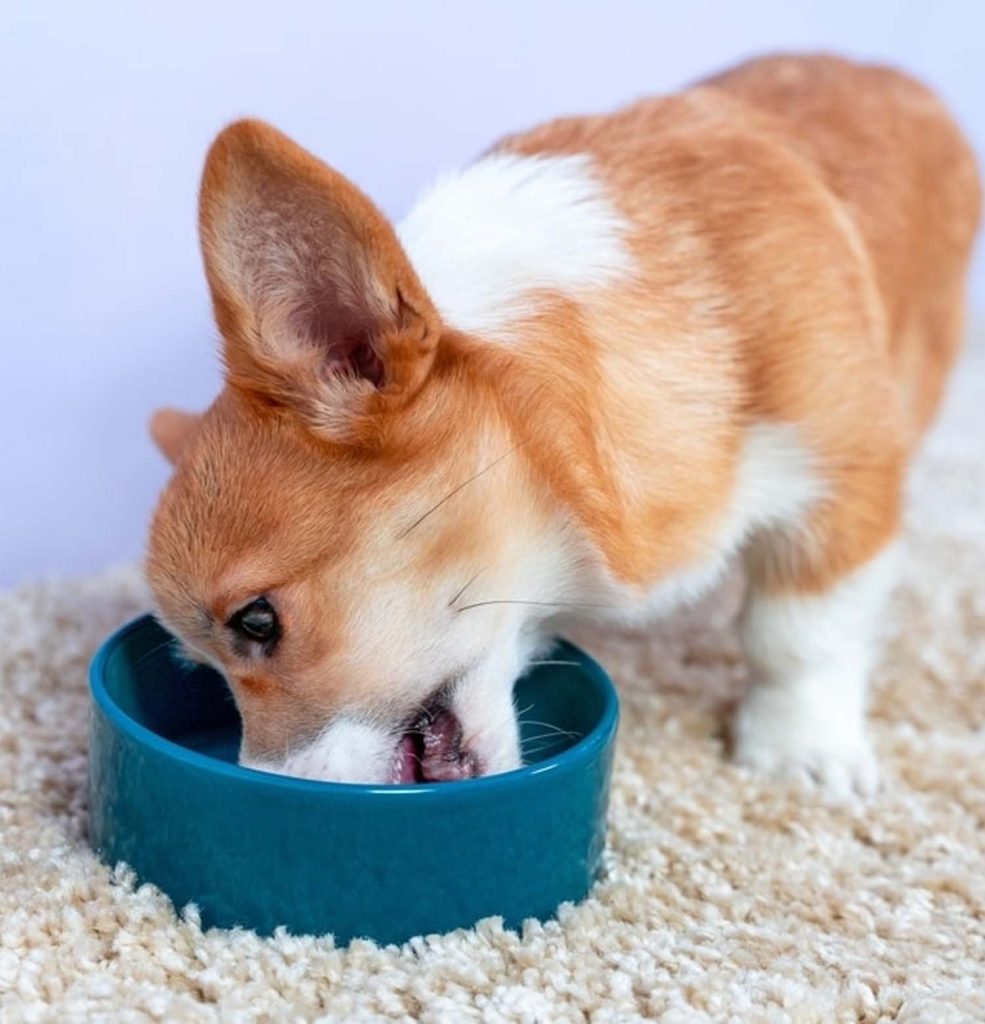Introduction
Corgis are one of the most beloved dog breeds, known for their adorable appearance and playful personality. However, to keep them healthy and active, providing the right diet is essential. Many Corgi owners wonder, “What do Corgis eat?” and “How can I create the best diet plan for my Corgi?” A well-balanced diet helps prevent obesity, supports strong bones, and ensures overall well-being. This article will guide you through the best foods, feeding schedules, and essential nutrition tips for your Corgi.
Essential Nutrients for a Healthy Corgi Diet

A well-balanced diet ensures that your Corgi stays energetic, fit, and happy. Here are the key nutrients that should be included in their meals.
Protein – The Most Important Nutrient
Protein is crucial for muscle development, immune system support, and energy levels. The best sources of protein for Corgis include:
- Lean meats (chicken, beef, pork, lamb)
- Fish (salmon, tuna – rich in omega-3 for skin and coat health)
- Eggs (a great source of protein and vitamins)
- Organ meats (liver, kidney – provides iron and vitamin A, but should be fed in moderation)
Healthy Fats – Essential for Energy and Coat Health
Fats are important for maintaining a shiny coat and providing energy. Healthy fat sources include:
- Fish oil and olive oil (promotes healthy skin and fur)
- Natural animal fat from lean meats like chicken and beef
Carbohydrates – A Source of Energy
Although Corgis do not require a large amount of carbohydrates, they still need some to maintain energy levels. Healthy sources include:
- Sweet potatoes (rich in fiber and vitamins)
- Brown rice (good for digestion)
- Whole grain bread (provides slow-releasing energy)
Vegetables – Support Digestion and Provide Vitamins
Vegetables are a great source of fiber, vitamins, and minerals, keeping your Corgi’s digestion healthy. Safe options include:
- Carrots (high in vitamin A, good for eyesight)
- Pumpkin (helps with digestion and regulates bowel movements)
- Spinach and broccoli (rich in fiber and vitamin C)
Fruits – A Natural Vitamin Boost
Some fruits provide essential vitamins and antioxidants but should be given in moderation. Safe fruits for Corgis include:
- Apples (fiber-rich and helps clean teeth)
- Bananas (contain potassium and vitamin B6)
- Strawberries and blueberries (loaded with antioxidants for overall health)
Foods That Corgis Should Avoid
Not all foods are safe for Corgis. Some can be toxic and cause serious health issues. Avoid feeding your Corgi the following:
- Chocolate (contains theobromine, toxic to dogs)
- Onions and garlic (can cause anemia)
- Small bones and cooked bones (can splinter and cause choking or internal injuries)
- Milk and dairy products (can cause digestive issues due to lactose intolerance)
- Grapes and raisins (can cause kidney failure)
- Salty, spicy, or greasy foods (can cause digestive problems and obesity)
Feeding Schedule Based on a Corgi’s Age

Corgi Puppies (2 – 6 months old)
- High-protein and high-calcium diet for growth and bone development.
- Feed 3 – 4 meals per day with soft, easily digestible food.
- Provide high-quality puppy food or homemade meals with lean meats and mashed vegetables.
- Supplement with puppy-friendly milk if needed.
Adult Corgis (6 months – 6 years old)
- Maintain energy levels and prevent obesity.
- Feed 2 meals per day with a mix of protein, healthy fats, and fiber.
- Combine premium dry kibble with fresh ingredients.
- Monitor portion sizes carefully.
Senior Corgis (6 years and older)
- Lower-calorie diet with more fiber to aid digestion.
- Feed 2 small meals per day with controlled portions.
- Reduce fat and carbohydrate intake.
- Add glucosamine and omega-3 supplements to support joint health.
Important Feeding Tips for Corgi Owners
- Portion control is key: Corgis are prone to obesity; avoid overfeeding.
- Split meals into smaller portions: Improves digestion and prevents bloating.
- Always provide fresh water: Keep a bowl of clean water available at all times.
- Combine diet with regular exercise: A proper feeding routine should pair with daily walks and playtime.
Conclusion
A nutritious diet is essential for keeping your Corgi happy, healthy, and full of energy. A well-balanced meal plan with high-quality protein, healthy fats, fiber-rich vegetables, and fruits will support their overall well-being. Avoid feeding harmful foods, regulate portion sizes, and ensure they get enough exercise to prevent obesity-related issues.
If you want your Corgi to thrive, invest in a healthy diet and proper nutrition. Your furry friend will reward you with endless love, energy, and joy! 🐶💕

